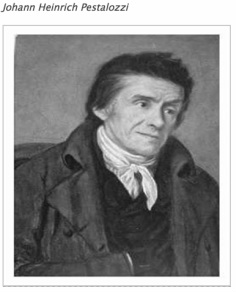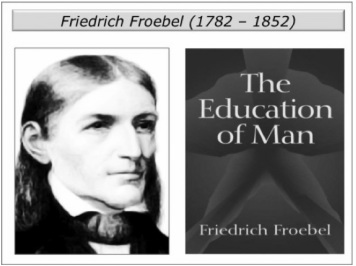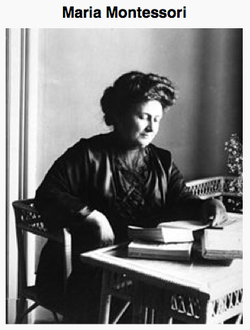Please See the article
"The State of Education - Its Past - Its Future"
At the Bottom of this Page
"The State of Education - Its Past - Its Future"
At the Bottom of this Page
The pedagogies that have most influenced John Rutherfurd's Philosophy of Education are rooted the theoretical frameworks and practices enumerated by the founders of modern education.
The most enlightening educational principles are
simple, functional and transferable.
All people are born - Natural Learners
"Real Learning" does not take place without the active engagement of the learner.
Balanced Learning is a multi-sensory activity.
Creative Environments positively effect learning.
The most fundamental role of a teacher is to nurture and encourage
self motivated discovery.
The most enlightening educational principles are
simple, functional and transferable.
All people are born - Natural Learners
"Real Learning" does not take place without the active engagement of the learner.
Balanced Learning is a multi-sensory activity.
Creative Environments positively effect learning.
The most fundamental role of a teacher is to nurture and encourage
self motivated discovery.

Comenius, who lived from 1592 to 1670, was a Moravian theologian and educator who became bishop of the Unity of Brethren. Traveling all over Europe, he dedicated himself to helping students to learn. He also implored people to recognize they were part of one human family – rather divide over national rivalries.
Comenius is considered by many to be ‘the father of modern education’. He believed in providing education for all children – both girls and boys – not just those from richer families. He produced the first picture book for children and his books were translated into the major European Languages.
Here are some of the best known quotes from his book The Great Didactic (sometimes known as The Whole Art of Teaching)
Learning is Natural - “Who is there that does not always desire to see, hear, or handle something new? To whom is it not a pleasure to go to some new place daily, to converse with someone, to narrate something, or have some fresh experience?”
“In a word, the eyes, the ears, the sense of touch, the mind itself, are, in their search for food, ever carried beyond themselves …”
“The proper education of the young does not consist in stuffing their heads with a mass of words, sentences, and ideas dragged together out of various authors, but in opening up their understanding to the outer world, so that a living stream may flow from their own minds, just as leaves, flowers, and fruit spring from the bud on a tree.” [1] [*]
Comenius is considered by many to be ‘the father of modern education’. He believed in providing education for all children – both girls and boys – not just those from richer families. He produced the first picture book for children and his books were translated into the major European Languages.
Here are some of the best known quotes from his book The Great Didactic (sometimes known as The Whole Art of Teaching)
Learning is Natural - “Who is there that does not always desire to see, hear, or handle something new? To whom is it not a pleasure to go to some new place daily, to converse with someone, to narrate something, or have some fresh experience?”
“In a word, the eyes, the ears, the sense of touch, the mind itself, are, in their search for food, ever carried beyond themselves …”
“The proper education of the young does not consist in stuffing their heads with a mass of words, sentences, and ideas dragged together out of various authors, but in opening up their understanding to the outer world, so that a living stream may flow from their own minds, just as leaves, flowers, and fruit spring from the bud on a tree.” [1] [*]

Pestalozzi, who lived from 1746 to 1827, this Swiss educator believed in offering all children the opportunity of a good education. Pestalozzi explained his approach in a book called How Gertrude Teaches Her Children: An attempt to help mother to teach their children and an account of the method. He thought it was vital:
To recognize that each child’s personality is sacred.
To provide a safe environment in which children could learn (no flogging!).
To include the five senses in the learning process. He believed it called for providing learning that connected the hand, heart and head. This also meant learning both indoors and outdoors.
To start with concrete work – then move to abstraction. This called for an emphasis on learning by doing, clarifying the thinking and then practicing. He believed in encouraging children to think for themselves.
To recognize that love of learning will continue to drive learning far into the future. [1] [*]
To recognize that each child’s personality is sacred.
To provide a safe environment in which children could learn (no flogging!).
To include the five senses in the learning process. He believed it called for providing learning that connected the hand, heart and head. This also meant learning both indoors and outdoors.
To start with concrete work – then move to abstraction. This called for an emphasis on learning by doing, clarifying the thinking and then practicing. He believed in encouraging children to think for themselves.
To recognize that love of learning will continue to drive learning far into the future. [1] [*]

Froebel, The pioneer who gave birth to the kindergarten - ‘the children’s garden’ provided me with the foundation of my educational philosophy. I became fascinated with and began study of his philosophy, methodology and work when I was still in undergraduate school, 25+ years ago.
Froebel believed children need a "place" where they could be cherished, stimulated and helped to flourish. His genius and deep inspiration will forever inform and benefit the art and science of educational practice.
His ideas were adopted by many "ambassadors" who spread the materials and methods he developed across the globe. These influenced the upbringing of people such as Frank Lloyd Wright, Buckminster Fuller, Paul Klee, Wassily Kandinsky, Enid Blyton and Bertrand Russell.
Writing in The Education of Man, Froebel explained:
“The mind grows by self revelation. In "play" the child ascertains what he can do, discovers his possibilities of will and thought by exerting his power spontaneously. In "work" he follows a task prescribed for him by another, and does not reveal his own proclivities and inclinations – but another’s. In play he reveals his own original power.”
Froebel designed a series of wooden block called "Gifts" which were set up as centers and allowed children to engage in independent studies. “The blocks can be arranged to form patterns of symmetry and harmony. Froebel also called this dancing as the blocks are progressively rearranged to reveal evolving patterns of increasing complexity.”
Froebel believed that each child had their own rhythm. They would learn when they were ready to learn. The educator’s role was to provide the encouragement and stimulation to help them develop.
It is vital to give each child the opportunity to explore different materials, create new things and achieve a sense of completion.
People can be helped to develop through play and other creative activities.
Creative people retain a sense of play. They love to follow their passion, pursue possibilities and create finished products. Play can be a starting point for creativity, but progress does not always come easily. Doing what you love can involve overcoming tough challenges. Creative people do what they enjoy but they also love to ‘sweat’. They gain a great sense of satisfaction from completing a task that adds to life, knowledge or beauty. [1] [*]
Froebel believed children need a "place" where they could be cherished, stimulated and helped to flourish. His genius and deep inspiration will forever inform and benefit the art and science of educational practice.
His ideas were adopted by many "ambassadors" who spread the materials and methods he developed across the globe. These influenced the upbringing of people such as Frank Lloyd Wright, Buckminster Fuller, Paul Klee, Wassily Kandinsky, Enid Blyton and Bertrand Russell.
Writing in The Education of Man, Froebel explained:
“The mind grows by self revelation. In "play" the child ascertains what he can do, discovers his possibilities of will and thought by exerting his power spontaneously. In "work" he follows a task prescribed for him by another, and does not reveal his own proclivities and inclinations – but another’s. In play he reveals his own original power.”
Froebel designed a series of wooden block called "Gifts" which were set up as centers and allowed children to engage in independent studies. “The blocks can be arranged to form patterns of symmetry and harmony. Froebel also called this dancing as the blocks are progressively rearranged to reveal evolving patterns of increasing complexity.”
Froebel believed that each child had their own rhythm. They would learn when they were ready to learn. The educator’s role was to provide the encouragement and stimulation to help them develop.
It is vital to give each child the opportunity to explore different materials, create new things and achieve a sense of completion.
People can be helped to develop through play and other creative activities.
Creative people retain a sense of play. They love to follow their passion, pursue possibilities and create finished products. Play can be a starting point for creativity, but progress does not always come easily. Doing what you love can involve overcoming tough challenges. Creative people do what they enjoy but they also love to ‘sweat’. They gain a great sense of satisfaction from completing a task that adds to life, knowledge or beauty. [1] [*]

Montessori, who lived from 1870 to 1952 was an Italian physician and educator best known for the philosophy of education that bears her name, and her writing on scientific pedagogy. Her educational method is in use today in public and private schools throughout the world.
Montessori education is characterized by an emphasis on independence, freedom within limits, and respect for a child’s natural psychological, physical, and social development. Although a range of practices exists under the name "Montessori", the Association Montessori Internationale (AMI) and the American Montessori Society (AMS) cite these elements as essential to Montessori education:
Mixed age classrooms
Student choice of activity from within a prescribed range of options.
Uninterrupted blocks of work time, ideally three hours.
A constructivist or "discovery" model, where students learn concepts from working with materials, rather than by direct instruction.
Specialized educational materials developed by Montessori and her collaborators.
Freedom of movement within the classroom.
A trained Montessori teacher. [2][3][*]
References .
[1] The text references an article called Friedrich Froebel’s Work On Strengths published on the website of
"The Strengths Foundation".
http://www.thestrengthsfoundation.org/3-tips-for-understanding-friedrich-froebels-work-on-strengths
[2] "AMI School Standards". Association Montessori Internationale-USA (AMI-USA).
[3] "Introduction to Montessori". American Montessori Society (AMS).
[*] The previous citations are well established in ample historical texts and modern day journals and websites.
Montessori education is characterized by an emphasis on independence, freedom within limits, and respect for a child’s natural psychological, physical, and social development. Although a range of practices exists under the name "Montessori", the Association Montessori Internationale (AMI) and the American Montessori Society (AMS) cite these elements as essential to Montessori education:
Mixed age classrooms
Student choice of activity from within a prescribed range of options.
Uninterrupted blocks of work time, ideally three hours.
A constructivist or "discovery" model, where students learn concepts from working with materials, rather than by direct instruction.
Specialized educational materials developed by Montessori and her collaborators.
Freedom of movement within the classroom.
A trained Montessori teacher. [2][3][*]
References .
[1] The text references an article called Friedrich Froebel’s Work On Strengths published on the website of
"The Strengths Foundation".
http://www.thestrengthsfoundation.org/3-tips-for-understanding-friedrich-froebels-work-on-strengths
[2] "AMI School Standards". Association Montessori Internationale-USA (AMI-USA).
[3] "Introduction to Montessori". American Montessori Society (AMS).
[*] The previous citations are well established in ample historical texts and modern day journals and websites.
The State of Education - Its Past - Its Future
an article by
John Ian Rutherfurd
an article by
John Ian Rutherfurd
How can we teach students to become more intelligent than we are? Froebel's answer to this question formed the unifying theoretical foundation for all his educational endeavors. The essence of his genius is beautifully simple. His answer was and is: The Kindergarten. Kindergarten needs to be translated as "'The Kind' Child's Garden" because, for Froebel the aspect of the Kindergarten's "kindness" was essential. But this "kindness" should not be only understood as a form of tender sensitivity but also, the rigorous application of Froebel's preeminent guiding principle. For a student to become more intelligent than, the master, the student must "learn" directly from "the truth". When a student can see the world for what it "truly is" without the color of predetermined prejudice, unhindered by enforced devotion to the preloaded answers that society and systems of education all too often load into the minds of young discoverers; Then, that student can become able to form new connections and arrive at new answers and novel solutions beyond the ability of their teacher. Thus, the atmosphere created by a method of instruction that allows and nurtures exploration and independent discovery for the sake of exploration and independent discovery, when coupled with "The 'place' of Learning" form a real Kindergarten or "Kind Child's Garden". This type of "kindness" is essential to the students realization of their "true potential" because it is completely respectful of their uniquely capable ability. Regardless of a students creative, intellectual, psychological, emotional status or "learning level", The "Kind Garden" promotes the engagement and growth of their whole being because of the Kindergarten's "kindness' toward the individuals unique ability. Froebel's method for achieving this atmosphere was the subject of his life's work and is more than can be explored here; But suffice it to say that, his molding of a "place" equipt with advanced learning materials combined with the application of "kind methodologies" from trained teachers, form one of the most advanced pedagogies yet to be describe and employed in human history. In Froebel's lifetime he was exiled from Prussia for teaching mothers to teach their children in methods contrary to the kings liking. He was later repatriated after his method of education rapidly spread throughout the world because of its immense success, having truly enlightening effects. In the mid 1800's parents from Europe, to Japan to America embraced the New Paradigm of Education created by Froebel's Kindergarten. Thousands of private Kindergartens sprang up all over the globe only to meet their demise because of the advancement of "public schools" after World War I. Of course Kindergarten remains, But in name only. There are literally only several handfuls authentic Kindergartens in the world today. The fact that the name persists is a testament to the original effectiveness of Froebel's pedagogy. The fact that they exist in name only is also a testament to other global factors that are too complex to explore here.
Unfortunately the system of education developed by Maria Montessori met a similar fate with the advance of "public education". Though Montessori schools survived better than Froebel's Kindergartens the original intent of Maria Montessori has only been partially realized. Building on Froebel's model, Montessori likewise produced a series of advanced educational materials that allow students the opportunity of independent discovery. She developed highly effective teaching methods and insisted on trained teachers. But she had another idea which was grounded in her medical and scientific training. Montessori realized that despite her life long devotion to the advancement of eduction she would not be able to develop the best possible school or supporting materials. Thus she proposed and set up Montessori schools as Scientific "Teaching and Learning Laboratories" in which "Educational Experiments" could be conducted and recorded to determine the absolutely best methods - generally or for a specific community of students or society. Her idea was that schools would systematically be improved based on their experiences as well as the analysis of detailed data collection regarding the failures and successes of various supplemental materials or employed methodologies. Montessori of course envisioned that the knowledge gained would be shared with other Montessori schools and must have further hypothesized that this scientific method of advancing the art and science of education would spread to other types of schools regardless of its particular pedagogy. The Idea of The School as "learning/teaching/educational laboratory" cements Maria Montessori as one of the last truly great minds in the advancement of modern education because this method of developing the school as tool for advancing the materials and methods utilized by educators is penultimate to the great advancements in the theory and practice of educating our children. Why virtually all schools don't employ this century old scientific method of improving the way in which we learn to educate our children is a very good question. Why we stand at the beginning of the 21st century with all our technological advancements and simultaneously in the midst of failing state sponsored school systems, is another. One suggested answer is that the general public, politicians, business people and even educators keep looking toward how we can improve the "indicators" regarding the health of current mass education systems but fail to seriously consider that the predominant systems may be fundamentally flawed. Regardless of the reasons, it is globally obvious that we need fundamental and systematic change regarding our methods of educating children. While surveys indicate that students from countries like Japan, Korea and Singapore, do well on international tests, they also indicate some of the highest statistics of student suicide. This is a despicable measure of success and indicates fundamental flaws regarding the system of education utilized. In complete contrast, is Finland, where students and teachers love school and routinely score higher than the previously mention countries on international tests. The fact that there are many far superior schools models from history as well as currently in existence, should provide great hope that we can soon fundamentally and greatly improve the value of our schools. We need Consider the wisdom of Montessori and Froebel and look toward and build upon examples of great success. We Must abandon the compromises that lead to mediocrity. We must become radical in our intention and effort to make and even force positive change. We need be fearless in abandoning what does not work and seek out and embrace what does. This task should not actually be that hard. After all, education is something we have been providing our children since the beginning of time! It does require that we more fully commit to provide "The Very Best" - "Education for Life". In the words of Friedrich Froebel...
Unfortunately the system of education developed by Maria Montessori met a similar fate with the advance of "public education". Though Montessori schools survived better than Froebel's Kindergartens the original intent of Maria Montessori has only been partially realized. Building on Froebel's model, Montessori likewise produced a series of advanced educational materials that allow students the opportunity of independent discovery. She developed highly effective teaching methods and insisted on trained teachers. But she had another idea which was grounded in her medical and scientific training. Montessori realized that despite her life long devotion to the advancement of eduction she would not be able to develop the best possible school or supporting materials. Thus she proposed and set up Montessori schools as Scientific "Teaching and Learning Laboratories" in which "Educational Experiments" could be conducted and recorded to determine the absolutely best methods - generally or for a specific community of students or society. Her idea was that schools would systematically be improved based on their experiences as well as the analysis of detailed data collection regarding the failures and successes of various supplemental materials or employed methodologies. Montessori of course envisioned that the knowledge gained would be shared with other Montessori schools and must have further hypothesized that this scientific method of advancing the art and science of education would spread to other types of schools regardless of its particular pedagogy. The Idea of The School as "learning/teaching/educational laboratory" cements Maria Montessori as one of the last truly great minds in the advancement of modern education because this method of developing the school as tool for advancing the materials and methods utilized by educators is penultimate to the great advancements in the theory and practice of educating our children. Why virtually all schools don't employ this century old scientific method of improving the way in which we learn to educate our children is a very good question. Why we stand at the beginning of the 21st century with all our technological advancements and simultaneously in the midst of failing state sponsored school systems, is another. One suggested answer is that the general public, politicians, business people and even educators keep looking toward how we can improve the "indicators" regarding the health of current mass education systems but fail to seriously consider that the predominant systems may be fundamentally flawed. Regardless of the reasons, it is globally obvious that we need fundamental and systematic change regarding our methods of educating children. While surveys indicate that students from countries like Japan, Korea and Singapore, do well on international tests, they also indicate some of the highest statistics of student suicide. This is a despicable measure of success and indicates fundamental flaws regarding the system of education utilized. In complete contrast, is Finland, where students and teachers love school and routinely score higher than the previously mention countries on international tests. The fact that there are many far superior schools models from history as well as currently in existence, should provide great hope that we can soon fundamentally and greatly improve the value of our schools. We need Consider the wisdom of Montessori and Froebel and look toward and build upon examples of great success. We Must abandon the compromises that lead to mediocrity. We must become radical in our intention and effort to make and even force positive change. We need be fearless in abandoning what does not work and seek out and embrace what does. This task should not actually be that hard. After all, education is something we have been providing our children since the beginning of time! It does require that we more fully commit to provide "The Very Best" - "Education for Life". In the words of Friedrich Froebel...
"Come Let Us Live With Our Children"
